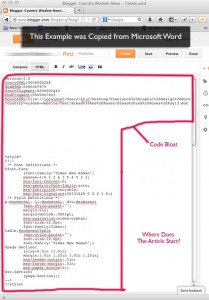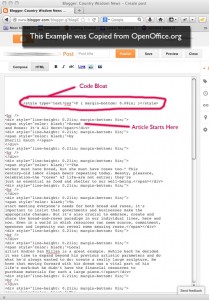It is no secret that there is a great deal of code bloat created by Microsoft Word. In fact, it is always recommended that any text posted onto the internet be copied from a basic text editor for this reason. In a perfect world this can always be done. However, in the real world, sometimes you just have to cut a few corners in order to get things done in a timely fashion. I made a discovery this week, regarding word processor code bloat as it pertains to Microsoft Word and OpenOffice.org.
Let me start from the beginning, I have been using an old version of Microsoft Office Word 2004 for Mac for almost as long as it’s been released. Being a graphic designer, pretty much the only thing that I need Word for is to open Doc files and paste them into InDesign or other text editors like TextEdit or TextWrangler. Shelling out $130 or more for the luxury of text editing just seems to be unfathomable. After all, I live in Rockland County near New York City and that $130 really needs to get spent on rent, or perhaps something more fun than a word processor.
Recently I’ve been running into more and more issue opening up .docx files. Therefore, I decided to give OpenOffice.org a go several months back and try to save the $130. I’d used Open Office for Mac in the past, but it needed to be run out of a Linux window and was a clunky nightmare as a result. Let me just start out by saying the current version of OpenOffice.org 3.4.1 is awesome and a vast improvement!
I’ve recently been involved with a website based in the Blogger/BlogSpot CMS platform. The project required taking tons of old content originally printed on paper and transferring the digital files to Blogger. I initially started copying the files into InDesign to lose all of the excess code bloat and then pasting the resulting text into Blogger’s compose post dialog box. Simple enough, but a lot of the text needed to be reformatted once I brought the stripped out text into Blogger. It was going to be way too time consuming to reformat everything.
Therefore, I took the lazy way out and just started posting it straight into Blogger from OpenOffice. Following this production method, I noticed right away that the Blogger Theme I was using was displaying some minor code bloat in the site’s post snippets. Well we can’t have that, so I reluctantly went into the HTML view and deleted the bloated code out of each article. It was still faster than re-typesetting everything, after all.
Last night, though, I pasted an old article out of Microsoft Word 2004, which I opened just out of old habit. I was surprised at how much more code bloat seemed to be getting carried over to blogger from Microsoft Word.
So I decided to conduct an experiment and share the results with you fine readers. Both of the examples below used the same exact Word Document. One example copies the document’s text directly from OpenOffice.org into Blogger. The Other copies the text Directly from Microsoft Word 2004 into Blogger.

An illustrated example of the amount of code bloat that is retained when a Word 2004 document is copied and pasted into an HTML text editor

An illustrated example of the amount of code bloat that is retained when a OpenOffice.org document is copied and pasted into an HTML text editor.
I think the results here, really speak for themselves and once again, Microsoft sucks! I’m starting to sound like a broken record. There is simply way more code bloat being produced by Microsoft Word than a OpenOffice.org text document. I found this to be pretty interesting, and useful information (I know I’m a total nerd). I only wish I could further this comparison experiment with Word Perfect, iWork and Microsoft Office X. Based on my statements above, there’s obviously no way I’m going to purchase any of those programs. If any of you readers happen to take an interest in this and want to conduct your own research with these other programs, I would love to see the results, please post them below.
Tags: blogger, blogspot, CMS, Code Bloat, docx, Graphic Designer, HTML, InDesign, iWork, Microsoft Word, New York City, OpenOffice.org, reformat, Rockland County, Text Edit, Text Wrangler, typeset, Word Perfect
